Finding the right personal CRM
The ultimate guide to selecting the right personal CRM for managing relationships that drive real-life connections.
Credits
Original Authors
Kevin Sun
Matthew Silberman
Introduction

Managing personal and professional relationships can sometimes feel a bit overwhelming, can't it? That’s where a personal CRM (Customer Relationship Manager) shines. It's a handy tool that helps you organize your contacts, remember those important little details, and nudges you to reach out regularly.
This guide explores why personal CRMs are so valuable, what to keep in mind when selecting one, and offers reviews of some of the top choices out there, including Dex, Notion, Clay, Folk, Monica, and more. We've also put together a feature comparison table and shared a glimpse of a few early pioneers in this space. Let’s dive in!
Why a Personal CRM is Important
Keeping in touch with those who truly matter can be challenging in this day and age of extensive social networks and seemingly endless contact lists. Anthropologist Robin Dunbar famously suggested humans can only comfortably maintain about 150 stable relationships (known as Dunbar’s Number). Yet in reality, professionals often meet far more people over a career. A personal CRM helps bridge this gap by acting as an external brain for your relationships.
Unlike traditional business CRM systems designed for sales teams and customer databases, a personal CRM is your private relationship operating system. It transforms scattered conversations, forgotten follow-ups, and lost connections into an organized network that actually grows stronger over time. Think of it as your relationship memory bank, capturing not just contact details, but the context that makes connections meaningful.
Key reasons to use a personal CRM:
Manage relationship overload: Contacts are spread across email, phone, LinkedIn, Facebook, and other platforms. Personal CRMs centralize this information, making it easier to keep track of interactions, birthdays, follow-ups, and context for every contact.
Support professional networking: Regular check-ins strengthen connections. A CRM gives reminders for outreach and keeps your network active, which can create more professional and business opportunities over time.
Stay organized and thoughtful: Personal CRMs let you save notes on each interaction, from conversation topics to job changes or personal preferences. Having this context helps you reconnect more meaningfully and avoid forgetting details like anniversaries or important updates.
Maintain work-life balance: Busy schedules can push personal relationships aside. CRMs remind you to reach out to family, friends, or colleagues, helping prevent relationships from slipping through the cracks.
Overall, whether you're nurturing professional networks, maintaining friendships across time zones, or simply wanting to remember important details about people who matter, a personal CRM creates the infrastructure for authentic connection. But with dozens of platforms claiming to solve this problem, how do you choose the right one?
Key Considerations for Choosing a Personal CRM
Not all personal CRMs are alike. Some are simple and social-focused, while others resemble lightweight sales CRMs. Use these factors to determine which tool fits your needs:
Integrations and data sync: Look for a CRM that connects with the tools you already use: email, calendar, LinkedIn, phone contacts, and messaging apps. Automatic syncing reduces manual entry and ensures your CRM stays up-to-date. Platforms that integrate with multiple channels (Gmail, Outlook, iMessage, WhatsAppTwitter, etc.) can act as a single source of truth for your relationships. Without integration, keeping data current can become a chore.
Ease of use: A CRM is only useful if you actually use it. Prioritize clean, straightforward interfaces without unnecessary sales features. Features like search, quick edits, and drag-and-drop make daily management easier. Decide if you prefer a ready-to-use app like Dex or Clay, or a customizable system like Airtable or Notion. The right tool should feel natural to maintain; if it’s too complicated, you’ll stop using it.
Automation and reminders: Personal CRMs handle the logistics of staying in touch. Set check-in intervals, and the system will prompt you when it’s time to reach out. Advanced tools can flag relationships you haven’t engaged with recently, send birthday reminders, suggest follow-ups after meetings, and even provide AI-based insights. This allows you to focus on the interaction itself instead of remembering the details.
Pricing and budget: Options range from free tools (or free tiers) to premium subscriptions, with many personal CRM plans falling between roughly $9 and $30 per month for full functionality. Free plans often come with limits on contacts or features, while paid tiers unlock integrations, automation, and advanced tools. For example, Dex costs about $12 per month when billed annually (with a free trial available), Clay starts around $10 per month (annual), and Covve offers a free tier with basic limits and a $9.99/month plan for unlimited contacts. Team‑oriented tools tend to cost more: Folk is around $20–$25 per user per month for standard plans, and Nimble sits at about $24.90 per user per month (annual). Other platforms like Monica have a free self‑hosted option or a cloud plan near $9/month.
Intended use case: Match the CRM to your goals. Professional networking tools like Dex, Clay, or Covve focus on business connections, while tools like Monica are better for personal relationships and family management. If your workflow is mobile-heavy, pick a mobile-first app. If collaboration is key, consider platforms with sharing features, like Folk or Airtable. The right CRM fits your focus, whether that’s personal, professional, solo, or team-based.
In-Depth Reviews of Top Personal CRMs
Here’s a look at eight popular and actively supported personal CRM solutions for 2026. We’ll break down what each tool is best for, along with its pros, cons, and pricing.
Dex: The Personal CRM for Meaningful Relationships
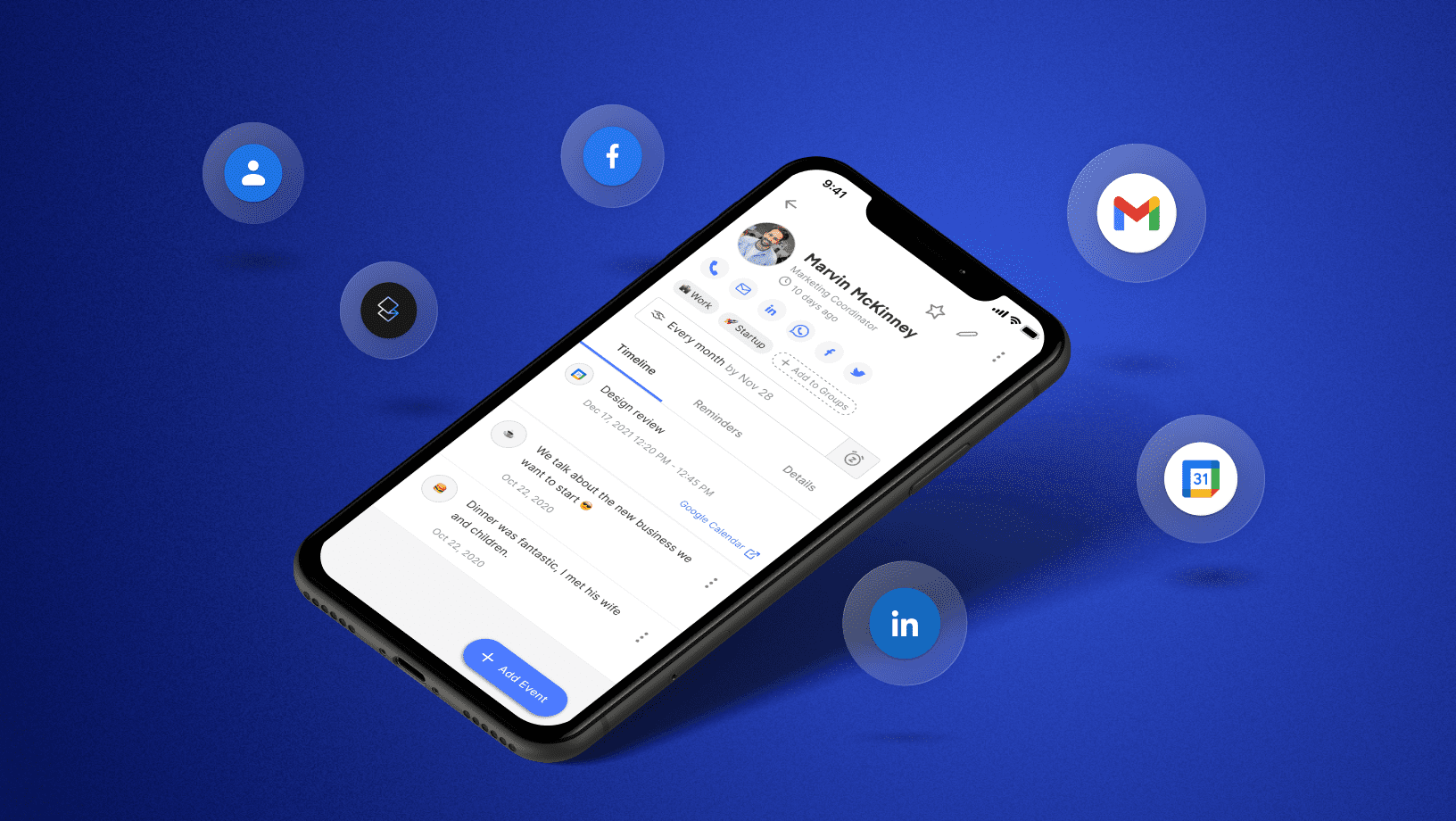
Overview: Dex is a personal CRM designed to help individuals manage both professional and personal relationships. It centralizes contacts, interactions, and reminders from email, calendar, and social platforms (including LinkedIn, Facebook, Gmail, Outlook, and messaging apps like WhatsApp and SMS).
Dex adds context to each relationship, sends proactive reminders, and offers AI-assisted features such as conversation prompts, pre-meeting briefs, and automated contact organization. By handling the organizational work, Dex lets you focus on meaningful interactions rather than data entry.
Pros:
True Cross-Platform Support: Dex works wherever you do. Whether you’re on iOS, Android, Windows, Mac, or the web, everything stays seamlessly in sync. You can log a note on your phone, review it on your laptop, and walk into a meeting fully prepared, without worrying about missing context across devices.
Comprehensive Integrations: Dex connects with Gmail, Outlook, Google Calendar, LinkedIn, Facebook, Twitter/X, WhatsApp, SMS, and more, giving you a complete picture of your interactions in one place. Instead of jumping between apps to piece together history, Dex centralizes your relationship context automatically.
AI-Powered Assistance: Dex doesn’t just store information, it helps you use it. AI features generate follow-up suggestions, conversation prompts, and messaging assistance via WhatsApp or SMS. Dex Copilot can summarize contact history, update fields, draft introductions, and even help compose thoughtful messages, making it easier to stay personal at scale.
Text Dex Like a Friend (SMS + WhatsApp): You can literally message Dex to log notes, set reminders, or search your network. It feels natural, like texting a personal assistant, so capturing context happens in the flow of your day instead of becoming another task on your to-do list.
Pre-Meeting Brief Emails: Before important calls or meetings, Dex sends you a concise summary with attendees, past interactions, shared notes, and meeting history. It dramatically reduces prep time and helps you show up informed and intentional.
Chrome Extension for Quick Saves: See someone on LinkedIn or another social platform? Save them to Dex instantly from your browser. No copying and pasting, no extra steps, just one click to turn a connection into an organized relationship.
Visual Interaction Management: Dex includes a Kanban-style “keep-in-touch” board that visually shows who you’ve reached out to and who’s due for follow-up. It’s an intuitive way to maintain consistent outreach without overthinking timing.
Map View for Real-World Connections: Planning travel or prioritizing in-person meetings? Dex’s map view lets you see where your contacts are located geographically, making it easy to coordinate meetups and stay intentional about face-to-face relationships.
Clean, Relationship-First Design: Unlike enterprise CRMs built for sales pipelines, Dex is designed for individuals. The interface is clean, intuitive, and uncluttered, making it easy to log notes, organize contacts, and set reminders without feeling like you’re managing a corporate database.
Cons:
Not for Team Collaboration: Dex is tailored for individual use and does not support multi-user contact management or shared pipelines.
Pricing:
Free Trial: Dex offers a 7-day free trial that lets you explore all core features before committing to a paid plan.
Premium ($12/month): Includes mobile, web, and desktop access, LinkedIn sync (2,500 connections), Map View, messaging and email integrations, two-way contact sync, custom fields, and contact import.
Professional ($20/month): Includes all Premium features plus LinkedIn sync (9,000 connections), mail merge, Outlook integration, multiple email account sync, API/Zapier access, and priority support.
Recommendation: Dex is ideal for professionals who network actively and want a single platform to manage emails, meetings, social updates, and messaging. Its AI features and pre-meeting briefs reduce the effort of staying connected, while reminders and visual boards help ensure relationships don’t fade. For individuals seeking a personal CRM that keeps all relationship data in one place and supports proactive outreach, Dex remains one of the most capable options available in 2026.
Clay: Apple Ecosystem and Social Insights CRM
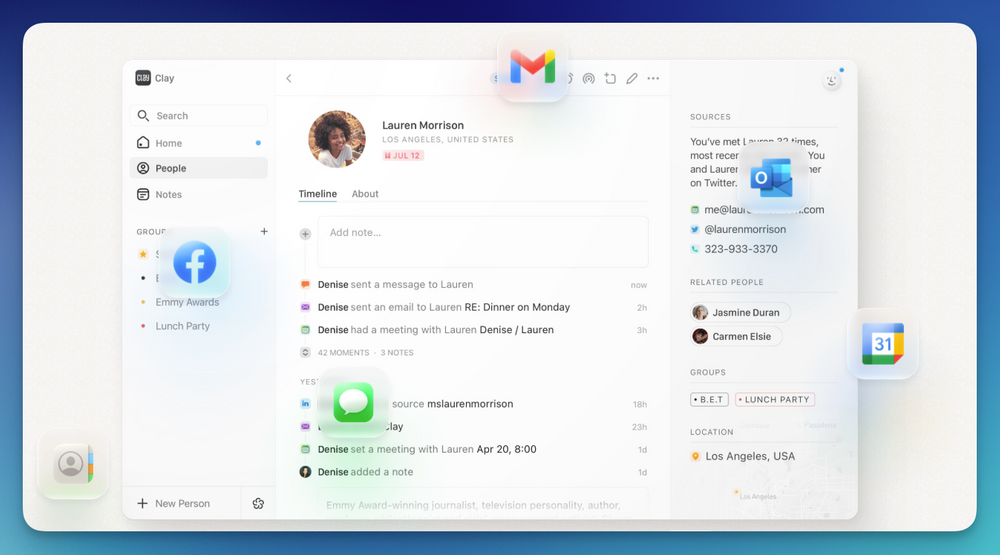
Overview: Clay revolutionizes personal CRM with its AI-powered approach to relationship intelligence, automatically enriching your contact database with comprehensive insights from across the web. This platform transforms how professionals discover and maintain meaningful connections by combining traditional CRM functionality with advanced data intelligence capabilities.
Pros:
Deep, Automatic Integrations: Clay connects with LinkedIn, Twitter/X, Facebook, Instagram, iMessage, WhatsApp, Gmail, Google Calendar, Outlook, iCloud, Notion, and more, so your contact profiles stay fresh without constant manual updates. It automatically pulls in work history, education changes, and social updates, helping you stay informed without stalking social feeds or copying details by hand.
Smart Reminders and Reconnect Prompts: Clay doesn’t just store information, it nudges you to use it. With daily and weekly prompts, plus AI-powered suggestions on who to reach out to and when, it helps you maintain relationships consistently. It’s like having a subtle reminder system that keeps important people from slipping through the cracks.
Cross-Platform Access: Clay is available on macOS, iOS, Windows (beta), and web, making it accessible across devices, especially for users in the Apple ecosystem. The interface includes theme customization, notifications, and quick interaction logging, so it feels polished and adaptable to your workflow.
Centralized Contact “Cards”: Every person in Clay has a dedicated profile card that shows their interaction timeline, connected platforms, notes, and updates. You can merge duplicates, edit details, and apply tags for organization. Everything about a relationship lives in one clean, centralized view.
Elegant, Design-Forward Interface: Clay is known for its minimal, modern design. It feels more like a beautifully crafted personal dashboard than a traditional CRM. Despite its simplicity, it supports advanced features like Markdown notes, OCR scanning, and AI-assisted organization, blending power with aesthetic clarity.
Cons:
No Android App: Clay does not currently offer a native Android app. While web access is available, Android users may find the experience less seamless compared to iOS and macOS users.
Limited Direct Browser Imports: Not all social platforms sync automatically. Some contacts require CSV uploads or manual imports, which can add friction compared to fully automated integrations.
Team Features Behind Higher Tiers: Collaboration and shared contact features are restricted to paid, higher-tier plans, making it less flexible for teams on a budget.
Pricing:
Free Plan: Includes core integrations and basic features.
Pro Plan: $10/month (billed annually) or $20/month (monthly) with advanced search, onboarding support, and AI features.
Team Plan: $40/month for up to 4 team members, adding shared contacts and collaboration features.
Recommendation: If you’re deep in the Apple ecosystem and want a beautifully designed, low-effort way to stay updated on your contacts, Clay is a fantastic choice. It automatically pulls in public updates, so you can walk into meetings already in the know, without the hassle of manually checking social media. That said, Clay isn’t for everyone. If you use Android or need a highly customizable CRM, you may want to look elsewhere. And while it does a great job gathering insights, it’s still up to you to act on them. Be sure to use the reminders and engage with what Clay surfaces to make the most of it.
Notion: The Versatile Workspace
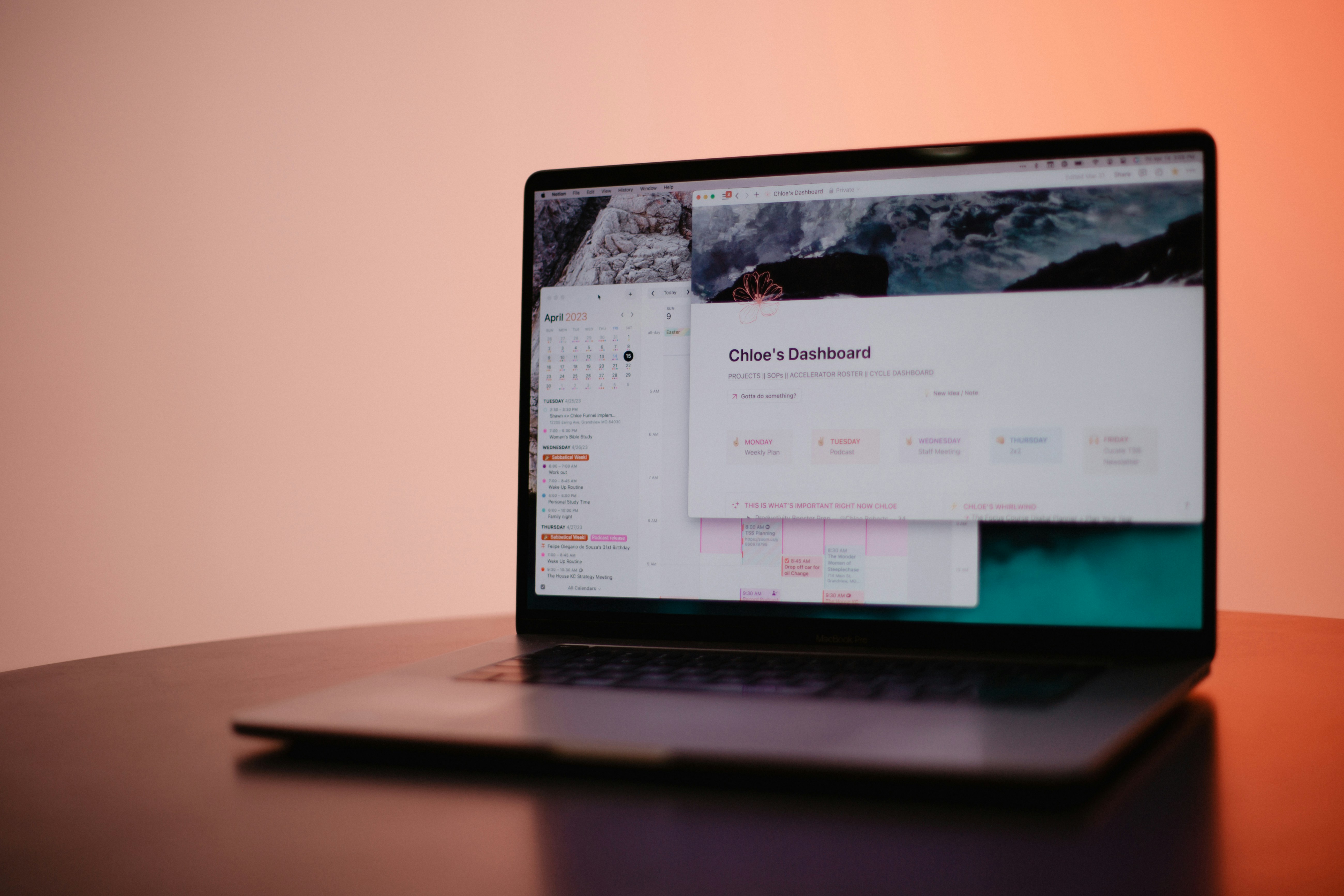
Overview: Notion is a flexible personal CRM that lets you design a system tailored exactly to your needs. Unlike traditional CRMs with fixed structures, Notion acts as a blank canvas where you can track contacts, interactions, and follow-ups in the way that works best for you. Its database and template system allows you to create custom properties, formulas, and workflows, giving you control over everything from conversation topics and networking goals to relationship scoring and follow-up schedules.
Pros:
Complete Customization: Notion gives you total control over how your personal CRM is structured. You can build contact databases, create dashboards, design templates, and track interactions exactly the way you prefer. Whether you want a simple contact list or a fully detailed relationship tracker with priorities and notes, Notion adapts to your system, not the other way around.
Seamless Context Through Integrations: Because Notion is more than a CRM, you can connect your contacts to project pages, meeting notes, life goals, or journal entries. This creates a bigger-picture view of your relationships, tying people directly to the work, ideas, and plans they’re connected to. It’s ideal if you like seeing your network within the broader context of your personal and professional life.
Intuitive, Flexible Interface: Once set up, Notion is clean and easy to navigate. Adding notes, organizing information, and jumping between linked pages feels natural. The drag-and-drop layout and database views (table, board, calendar, gallery) make it visually adaptable to your preferred way of thinking.
Generous Free Plan: Most individuals can build a fully functional personal CRM using Notion’s free plan. Paid tiers unlock features like version history, advanced permissions, and automation blocks, but many users won’t need them for personal relationship tracking.
Cons:
No Automatic Social Media Syncing: Notion doesn’t integrate directly with LinkedIn, Facebook, or other social platforms for contact imports. All data must be added manually or imported via CSV, which adds setup time.
Ongoing Manual Maintenance: Because everything is customizable, you’re responsible for maintaining templates, databases, and reminder systems. Recurring reminders often require pairing Notion with an external calendar tool such as Google Calendar.
Steeper Learning Curve: Building an effective personal CRM in Notion takes time and planning. To unlock its full potential, you’ll need some comfort with databases, relations, rollups, and formulas, which may feel overwhelming for beginners.
Pricing:
Free Plan: Full access to most personal features, sufficient for individual use.
Paid Plans: Start at $10 per member/month (billed annually) for advanced workspace features, version history, and additional customization options.
Recommendation: Notion works best for power users who want total control over their relationship management system. If you’re comfortable designing custom databases and linking contacts to your broader workflow, it can function as a highly personalized CRM that grows with your needs. While it requires more setup and manual upkeep than ready-made CRMs, Notion offers flexibility that other platforms can’t match, making it ideal for users who want a unified system for contacts, projects, and personal organization.
folk: A Visual Personal CRM for Individuals and Teams
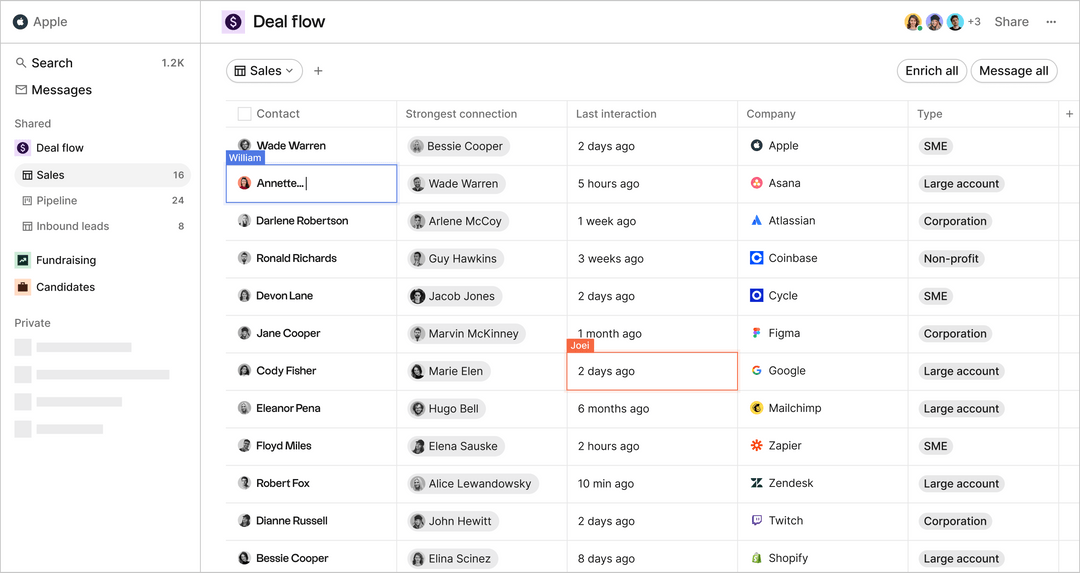
Overview: folk is a personal CRM designed around simplicity and visual clarity, ideal for users who want to manage relationships without the complexity of traditional CRMs. Built in Paris, Folk emphasizes intuitive design and customizable workflows, making it easy to organize contacts, track interactions, and maintain meaningful relationships. Unlike rigid enterprise systems, Folk lets you create flexible views, set gentle reminders, and enrich contact profiles automatically, so your CRM adapts to your way of working rather than forcing you into a fixed process.
Pros:
Clean, Intuitive Interface: One of the first things you’ll notice is how easy it feels to use. The interface is clean, modern, and thoughtfully designed so you’re not buried under menus or complicated workflows. That simplicity makes a big difference, when a tool feels frictionless, you’re much more likely to open it regularly and actually keep your contacts up to date.
Team Collaboration: If you’re working with others, this platform makes shared contact management straightforward. Teammates can collaborate on the same database, see interaction history, and stay aligned on who’s talking to whom. It’s especially helpful for small teams that need visibility without endless Slack threads or duplicated outreach.
Chrome Extension for Easy Imports: Adding contacts doesn’t feel like a chore. The Chrome extension lets you pull people in from various sources with just a few clicks, reducing manual entry and helping you build your database quickly. It’s a convenient way to turn scattered online interactions into organized relationships.
Flexible Workflows: Whether you’re managing personal connections or running a light sales pipeline, the system adapts to your needs. You can customize views and fields to match how you think and work, instead of forcing yourself into a rigid structure. That flexibility makes it useful across different use cases.
Multi-View System: Organization is visual and dynamic. You can switch between different layouts, like lists, boards, or grouped views, to see your contacts in the way that makes the most sense to you. This makes tracking relationships feel more manageable and less overwhelming.
Cons:
No Mobile App: Currently, access is web-only. That means you won’t have a dedicated iOS or Android app for quick updates on the go, which can be limiting if you rely heavily on your phone to log interactions in real time.
More Team- or Sales-Oriented: While it can be used personally, the structure leans more toward team collaboration and sales-style workflows. If you’re looking for a purely personal, relationship-first CRM, it may feel more operational than emotional.
Free Plan Limitations: The free tier is capped at 100 contacts and 100 messages. That’s enough to test the platform, but growing networks will likely require an upgrade.
Pricing:
Free Plan: Includes up to 100 contacts and 100 messages, giving you a chance to explore core features before committing.
Paid Plan: $25 per member per month (or $17.50 per member per month billed annually). Paid tiers unlock collaboration features, templates, and expanded database functionality for teams that need more scale and customization.
Recommendation: folk is best for users who want a modern, visual approach to relationship management and don’t mind working from the web. Its flexibility, collaborative features, and contact enrichment make it ideal for small teams or individuals managing complex networks. For those focused purely on personal networking, Folk may feel slightly overbuilt, but for hybrid personal/professional use or team-based workflows, it provides a streamlined and visually appealing CRM experience.
Monica: Personal Life and Open-Source CRM

Overview: Monica is a personal CRM built with privacy and customization in mind. Designed for individuals who want detailed control over their relationship data, Monica allows you to track interactions, personal preferences, and important dates without relying on third-party platforms. As an open-source solution, it can be self-hosted or used via Monica’s cloud service, giving users full control over their data. The platform focuses on meaningful personal connections rather than business workflows, making it ideal for family, friends, and personal networks.
Pros:
Privacy-Focused by Design: Monica gives you full ownership of your data. If privacy matters to you, you can self-host it on your own server and maintain complete control. There are no ads, no hidden data mining, just a secure space for your relationships.
Open-Source and Customizable: Because it’s open-source, Monica can be modified and extended to fit your needs. Tech-savvy users can tailor the platform, adjust features, and even contribute improvements. It’s a flexible system for those who like having control over how their tools work.
Comprehensive Personal Tracking: Monica goes beyond basic contact storage. You can track interactions, gifts, important dates, family relationships, personal preferences, and more. It’s especially helpful if you want to remember the small details that make relationships meaningful.
Simple, Modern Interface: Despite its depth, the web interface is clean and straightforward. It feels more like a thoughtful personal organizer than a complicated CRM dashboard, which makes it approachable even for non-technical users.
API and Automation Support: For advanced users, Monica offers an API that enables integrations and automation. If you enjoy connecting tools or building custom workflows, there’s room to expand beyond the basics.
Cons:
No Native Mobile Apps: Monica is web-based, with no dedicated iOS or Android apps. While you can access it from a mobile browser, it doesn’t offer the seamless, native on-the-go experience some users expect.
Manual Data Entry Required: Monica doesn’t automatically pull in contact updates from email or social platforms. Most information needs to be added manually, which means staying organized requires consistent effort.
Limited Automatic Integrations: Unlike more automated CRMs, Monica doesn’t sync directly with social media or email services by default. It prioritizes control and privacy over convenience.
Pricing:
Self-Hosted Version: Free, but requires technical knowledge to install and maintain on your own server.
Cloud-Hosted Version: $9 per month or $90 per year for a managed, hassle-free experience.
Recommendation: Monica is ideal for users who prioritize privacy and want a highly detailed, customizable personal CRM. Its open-source architecture and focus on personal relationships make it especially suitable for tracking family, friends, and private networks. While it requires more manual setup than fully integrated CRMs, it gives unmatched control and flexibility for those willing to invest the time.
Covve – Best Mobile Personal CRM for Networking
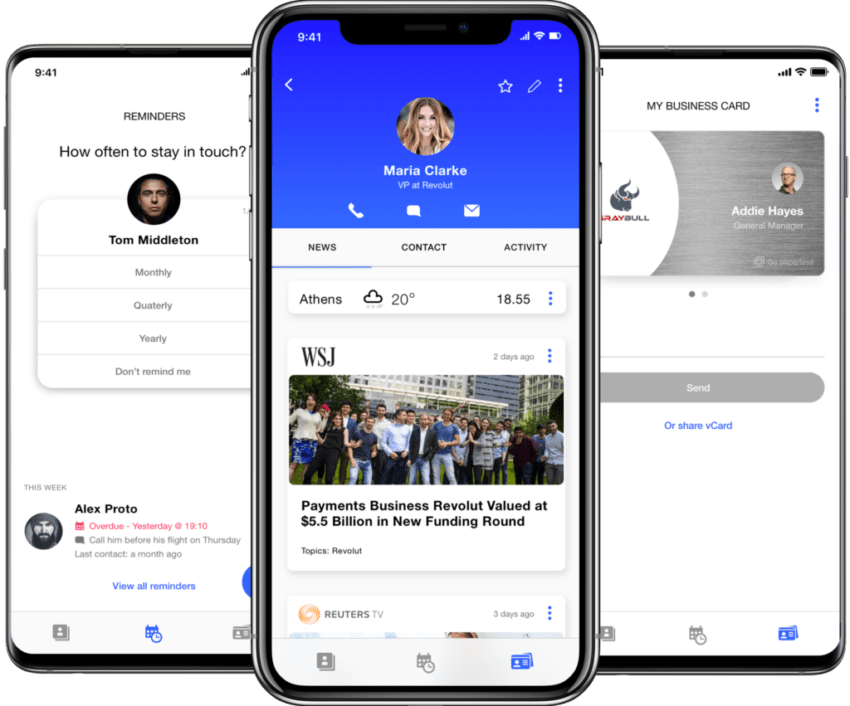
Overview: Covve is a mobile-first personal CRM designed for professionals who need to manage and grow their network while on the go. Unlike traditional CRMs that feel cumbersome on smartphones, Covve focuses on accessibility, real-time updates, and proactive networking. Its automatic contact enrichment system keeps your database current by updating job changes, locations, and other professional information from public sources. Covve is ideal for users who prioritize staying connected and informed, though it offers less deep customization than desktop-focused platforms.
Pros:
Mobile-First by Design: Covve is built specifically for professional networking on your smartphone. Everything, from logging notes to reviewing updates, is optimized for quick, on-the-go use. If you primarily manage relationships from your phone, Covve feels natural and streamlined rather than cramped or scaled down from desktop software.
Automatic News and Contact Updates: Covve helps you stay informed by surfacing news and publicly available updates about your contacts. Instead of manually checking what someone has been up to, you receive helpful context that makes reaching out more relevant and timely.
Smart Follow-Up Reminders: Maintaining professional relationships requires consistency, and Covve makes that easier. The app prompts you to reconnect at the right intervals, helping you stay top-of-mind without relying on memory alone.
Sleek, Intuitive Interface: The mobile experience is polished and easy to navigate. Logging interactions, browsing contacts, and setting reminders can be done in just a few taps, making it approachable even for users who don’t want a complex CRM.
Cons:
Mobile-Only (No Web/Desktop App): Covve is designed as a mobile-only app, meaning there’s no web or desktop version. If you prefer managing contacts on a bigger screen, typing notes on a keyboard, or analyzing your network in-depth, this might feel a bit limiting. Everything happens on your phone or tablet, making it a great fit for those who like to manage their network on the go.
Limited Free Plan: The free tier only supports up to 20 contacts, which is quite restrictive for most professionals. Serious use typically requires upgrading to the Pro plan.
No Direct Social Media Syncing: Covve does not automatically integrate with LinkedIn, Twitter/X, or Facebook for full data syncing, meaning some information may need to be updated manually.
Past Security Incident (2020): Covve experienced a data breach in 2020. While the company addressed the issue, privacy-conscious users may want to review current security practices before committing sensitive relationship data.
Pricing:
Free Plan: Limited to 20 contacts.
Pro Plan: $9.99/month (billed annually) or $12.99/month (billed monthly) for unlimited contacts and advanced features.
Recommendation: Covve is best for professionals who rely heavily on mobile communication and need a lightweight, proactive tool to track interactions and maintain relationships. It is particularly useful for business travelers or field-based networkers who want contact enrichment, follow-up reminders, and curated news about their connections. Its mobile-first design sacrifices some customization and desktop features but excels at keeping professionals informed and engaged wherever they are.
Airtable: Highly Customizable CRM for Complex Networks
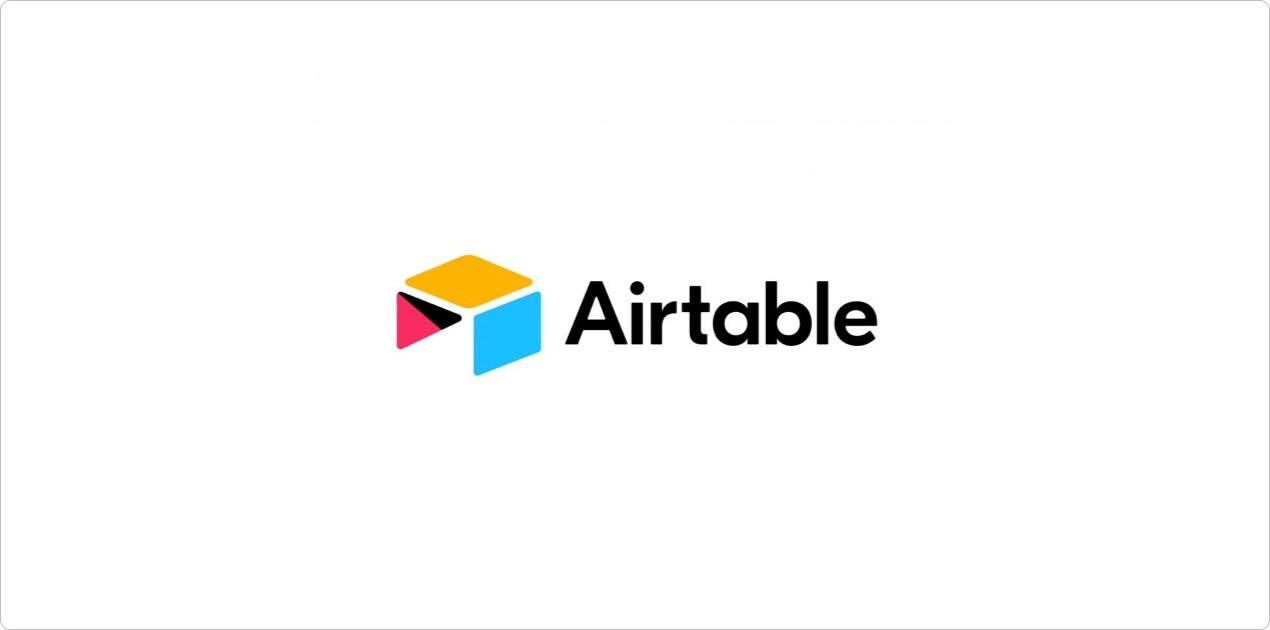
Overview: Airtable combines the familiarity of a spreadsheet with the power of a database, giving you full control over how you manage contacts and relationships. Unlike traditional CRMs with fixed structures, Airtable lets you create custom fields, multiple views, and interconnected records, allowing you to map people to companies, events, projects, and opportunities. This makes it ideal for professionals managing complex networks across multiple industries or projects. Airtable also supports team collaboration, so multiple users can work from shared databases while keeping individual notes and preferences.
Pros:
Extremely Flexible and Customizable: Airtable can be shaped into almost any type of relationship management system. Whether you’re organizing personal contacts, managing professional partnerships, or building a lightweight CRM for clients, the structure adapts to your needs. You’re not locked into a predefined workflow, you design the system yourself.
Built for Collaboration: Airtable shines when working with others. You can create shared bases, assign responsibilities, manage pipelines, and collaborate on contact records in real time. It’s particularly strong for teams that want visibility into shared networks without investing in a full enterprise CRM.
Interconnected Databases: One of Airtable’s biggest strengths is relational linking. You can connect contacts to companies, projects, meetings, events, or deals, creating a dynamic map of how everything (and everyone) is related. This makes it powerful for tracking complex networks and multi-layered relationships.
Rich Media and Contextual Data: Airtable allows you to attach files, images, documents, and detailed notes directly to contact records. Instead of just storing names and emails, you can build complete profiles with full context, making it especially useful for project-driven or content-heavy workflows
Cons:
Steeper Learning Curve: While powerful, Airtable requires thoughtful setup. Designing tables, relationships, automations, and views takes time and planning. Users unfamiliar with database-style systems may feel overwhelmed at first.
Potentially Overkill for Simple Needs: If you’re just looking for a straightforward personal CRM with reminders and light note-taking, Airtable may feel too complex. Its flexibility can become unnecessary friction for users who want something simple and ready-made.
No Native Relationship Reminders: Airtable doesn’t include built-in “keep-in-touch” reminders out of the box. Calendar notifications and recurring follow-ups require custom automations or third-party integrations, adding extra setup steps.
Pricing:
Free Plan: Offers essential database functionality with some limitations.
Paid Plans: Start at $20/month per seat (billed annually) for advanced features, automations, and larger storage limits.
Recommendation: Airtable is best for professionals, entrepreneurs, and consultants who manage intricate networks and want full control over their relationship data. Its flexibility and collaborative capabilities allow you to build a CRM that matches your workflow exactly, though it requires a larger initial setup effort than plug-and-play personal CRMs. If you enjoy customizing databases and connecting contacts to projects and opportunities, Airtable provides unmatched versatility.
Regards: Customizable CRM for Complex Networks
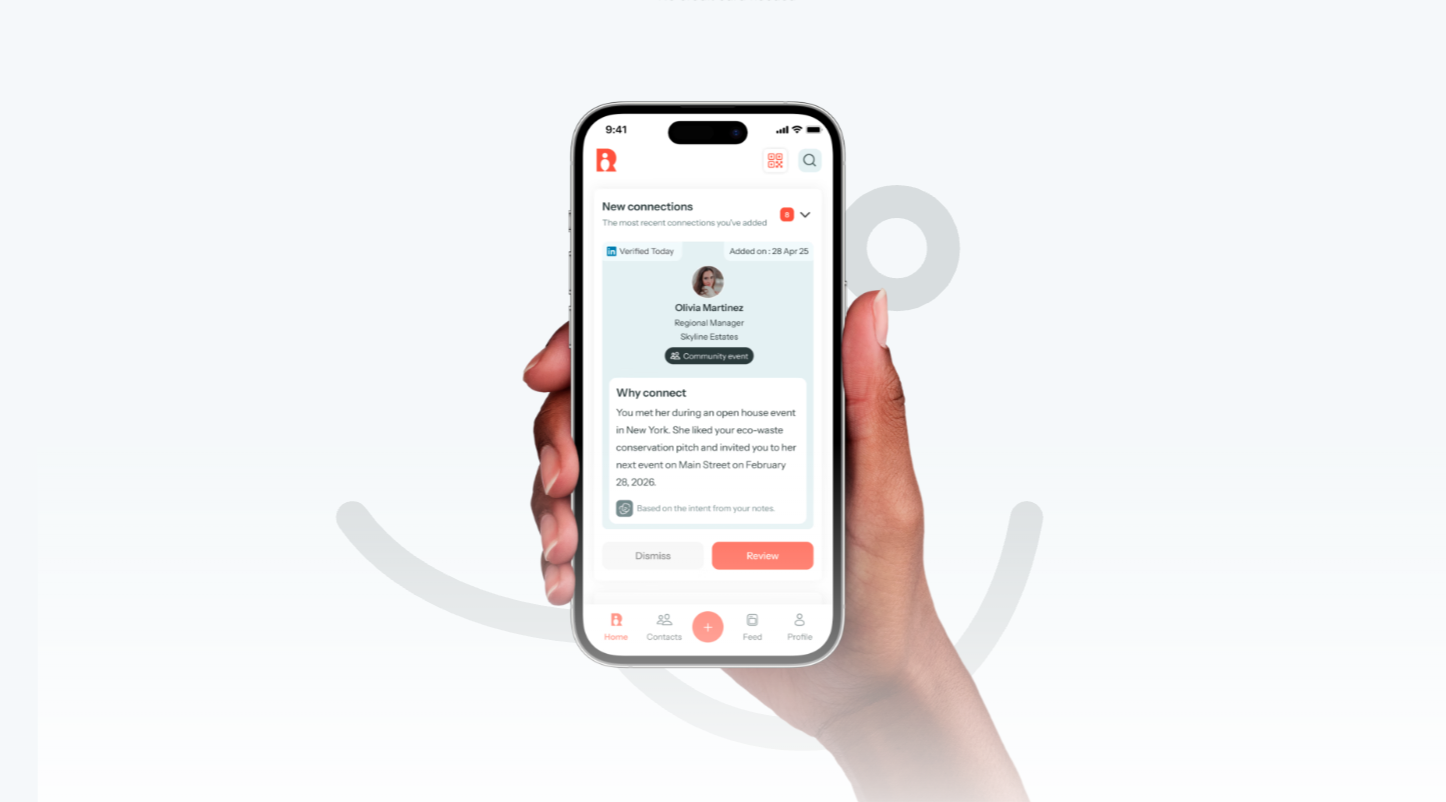
Overview: Regards is a relationship management platform designed to help individuals and teams maintain meaningful connections with less effort. Unlike basic contact apps, Regards captures the context, history, and nuances behind every relationship. Regards also emphasizes visualization, showing how your contacts connect to each other to reveal potential introductions or collaboration opportunities.
Pros:
AI-Driven Automation: Regards uses AI to automatically enrich contact profiles, surface insights, and generate smart follow-up reminders. This reduces manual tracking and helps ensure important relationships don’t fall through the cracks.
Team Collaboration: The platform supports shared contact management, making it easier for teams to align on outreach, coordinate introductions, and maintain a unified relationship strategy.
Personalization at Scale: By combining enriched data with automation, Regards enables more thoughtful and relevant communication without requiring constant manual effort. It’s designed to make scaling outreach feel intentional rather than transactional.
Modern, Intuitive Interface: Regards features a clean, contemporary design that prioritizes usability. The interface feels streamlined and approachable, even when managing larger networks.
Cons:
Feature Availability May Vary: As the platform evolves, certain features or integrations may not yet be fully available to all users or in all regions. Access to advanced functionality can depend on rollout phase or plan tier.
Pricing:
Launch/Pro Plan: ~$19.99 per month with a 14-day free trial (as used in marketing/comparisons,may be subject to change based on region or plan updates).
Recommendation: Regards is ideal for professionals and teams who manage large networks and want intelligent, context-aware support for maintaining connections. Its AI-powered enrichment, relationship summaries, and visual mapping make it easy to understand the full picture of your network and act on it without manual tracking. If you want a smart system that helps you follow up, stay connected, and uncover hidden networking opportunities, Regards offers a sophisticated solution.
Comparison Table: Top 8 Personal CRMs
Below is a comparison of eight personal CRM solutions across key features:
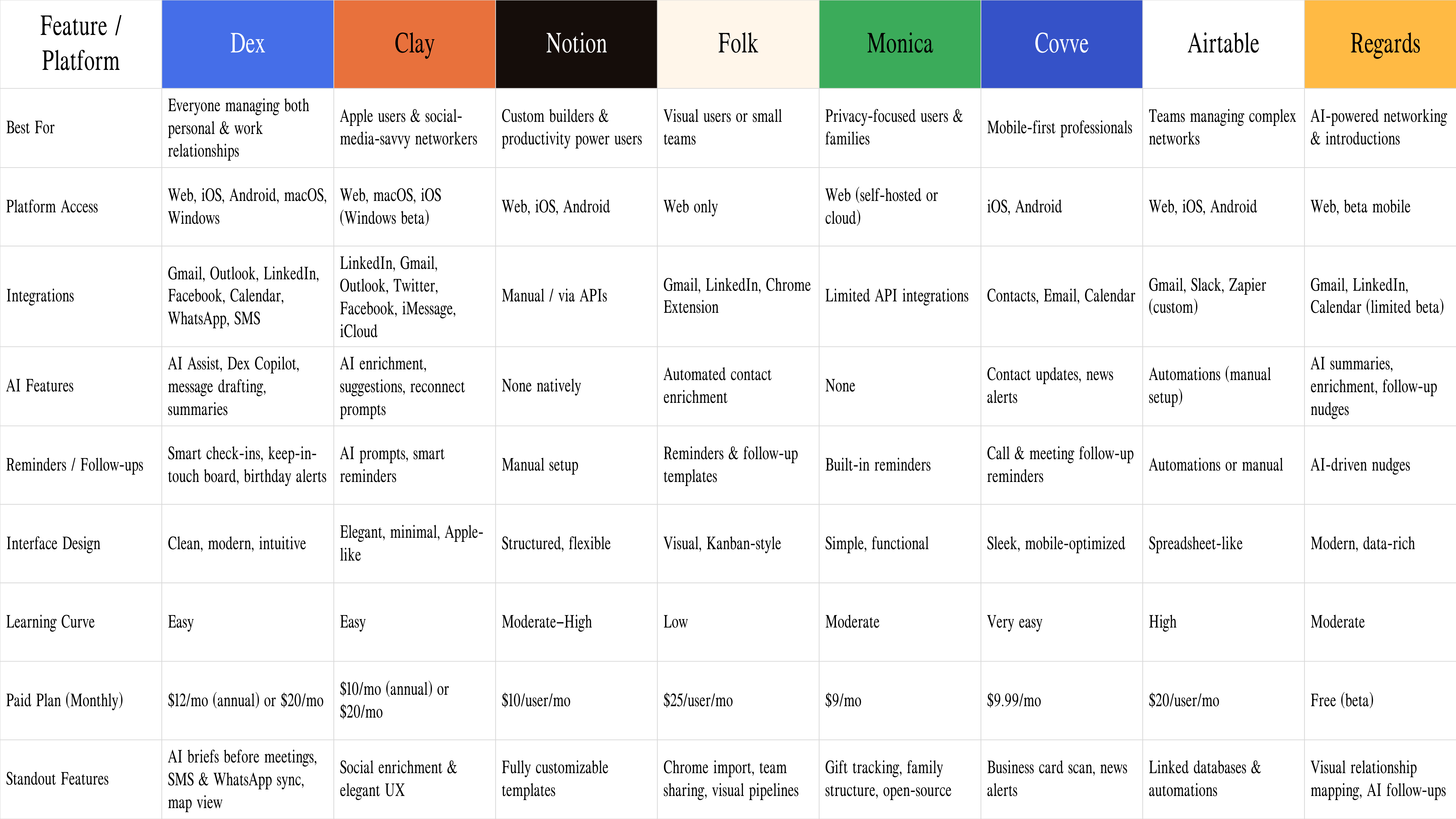
From the table, you can see that Dex and Clay both shine when it comes to automation and integrations, Dex works seamlessly as an AI-assisted personal relationship manager with a strong suit of integrations, while Clay leverages AI to surface smart insights. If teamwork is your focus, folk is a solid choice, while Monica keeps things simple with personal reminders and a privacy-first approach. Airtable and Notion offer extensive flexibility, but they require more hands-on setup (even if AI can assist in different ways). Covve is ideal if you prefer a mobile-first experience with AI-driven news, and Regards stands out for its AI-powered automation and relationship visualization, helping individuals and teams uncover meaningful connections without the weight of a traditional CRM.
Honorable Mentions for Defunct Personal CRMs
Over the years, a number of personal CRM startups have launched—and not all have survived. Here are a few notable ones that have either shut down or pivoted away from personal CRM, along with a brief note:
Conduit - Launched in 2018 by a Harvard dropout, Conduit was pitched as a “personal chief of staff,” using AI to help you stay in touch. It integrated with email, LinkedIn, and more, automatically reminding you to reconnect with friends. It even hit #1 on Product Hunt on launch day. But despite the buzz, it didn’t last—Conduit was eventually discontinued, and its domain changed hands.
Nat - Also known as Nat.app, this personal CRM leaned heavily on Google Contacts and email, using smart algorithms to figure out who you were losing touch with. Instead of manual logging, it let you reply to an email prompt to save notes—a unique approach at the time. Unfortunately, around 2021–2022, the project was shut down, and the founder moved on to other ventures.
UpHabit - Originally a mobile app focused on contact reminders and organization, UpHabit launched around 2018. But by 2022, it pivoted toward “relationship selling” and Salesforce integration, shifting away from personal CRM. Existing users were encouraged to find alternatives as the platform changed direction.
Garden - A simple, beautifully designed iOS app for managing contacts and setting reminders, Garden was the passion project of a solo founder. It built a small, dedicated following but was abandoned around mid-2020. With no updates since, it’s now effectively defunct and may not even work on the latest iOS.
Others: FollowUp, which pivoted to an email follow-up tool after being acquired in 2018; Nouri, which shifted focus to event networking; and Contacts+ (formerly FullContact), which evolved from an address book app with some CRM-like features into something different over time.
Each of these took a different approach to tackling relationship management, and while they didn’t last, they left behind valuable lessons. Conduit and Nat, for example, proved there’s real excitement around AI-powered automation in personal CRMs—but they also showed how tough it is to build a sustainable business around it.
Choosing the Right Personal CRM in 2026
Personal CRMs can be transformative for anyone looking to actively manage their relationships rather than passively letting contacts fade. The right choice depends on your specific needs:
If you want a powerful yet easy tool for professional networking, Dex is a top pick for most individuals.
If you’re an Apple user who values social insights, Clay offers a beautiful experience.
For those who love to custom-build and perhaps share with a team, Airtable or folk are excellent.
For ultimate flexibility and a DIY approach, Notion lets you build a powerful personal CRM your way.
If your focus is on personal/family relationships and privacy, Monica is ideal.
Need something mobile-first? Covve keeps you connected on the go.
If you want to keep track of connections for yourself and your team, Regards might be the one.
Whichever you choose, the fact that you’re considering a personal CRM means you care about your relationships. The most successful personal CRM implementations share common characteristics: they integrate seamlessly into existing workflows, provide value from day one, and grow with your network complexity.
Invest in the right tools, and you’re not just managing contacts, you’re also strengthening your network, your opportunities, and your future. Choose the platform that makes relationship nurturing feel natural rather than mechanical, and you'll be investing in relationships that compound over time.
After all, as the saying goes, “your network is your net worth,” and with the right personal CRM, you can manage them with purpose and ease. Choose the tool that helps you cultivate it effectively.